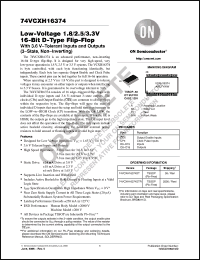|
|

|
|
| Partname: | 74VCXH16374DT |
| Description: | Low−Voltage 1.8/2.5/3.3V 16-Bit D−Type Flip−Flop With 3.6 V-Tolerant Inputs and Outputs (3-State, Non-Inverting) |
| Manufacturer: | ON Semiconductor |
| Datasheet: | PDF (246K).
Click here to download *) |
The 74VCXH16374 is an advanced performance, non-inverting 16-bit D-type flip-flop. It is designed for very high-speed, very low-power operation in 1.8 V, 2.5 V or 3.3 V systems. The VCXH16374 is byte controlled, with each byte functioning identically, but independently. Each byte has separate Output Enable and Clock Pulse inputs. These control pins can be tied together for full 16-bit operation. When operating at 2.5 V (or 1.8 V) the part is designed to tolerate voltages it may encounter on either inputs or outputs when interfacing to 3.3 V busses. It is guaranteed to be overvoltage tolerant to 3.6V. The 74VCXH16374 consists of 16 edge-triggered flip-flops with individual D-type inputs and 3.6 V-tolerant 3-state outputs. The clocks (CPn) and Output Enables (OEn) are common to all flip-flops within the respective byte. The flip-flops will store the state of individual D inputs that meet the setup and hold time requirements on the LOW-to-HIGH Clock (CP) transition. With the OE LOW, the contents of the flip-flops are available at the outputs. When the OE is HIGH, the outputs go to the high impedance state. The OE input level does not affect the operation of the flip-flops. The data inputs include active bushold circuitry, eliminating the need for external pullup resistors to hold unused or floating inputs at a valid logic state. Features |
|

Click here to download 74VCXH16374DT Datasheet*) |
 |
| *)Datasheets downloading from ChipDocs is only for our members (paid service). REGISTER NOW for your membership. |
|
|
|

